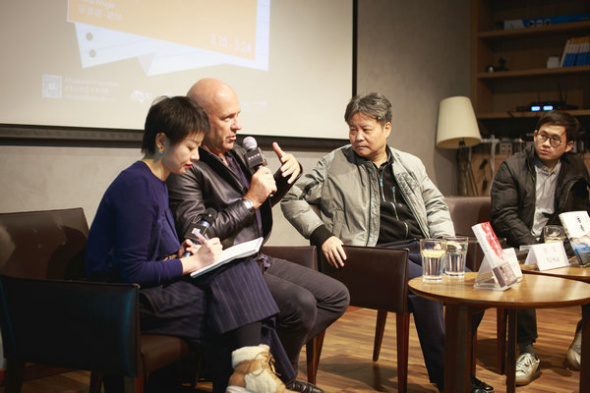
Australian writer Richard Flanagan (second left) and Chinese writer Yu Hua (second right) meet readers at an event in Beijing on Saturday. (Photo provided to China Daily)
It is Saturday, when Australian writer Richard Flanagan meets Yu Hua for the first time during an event at a Beijing bookstore. They seem to find a lot in common and any third person is unnecessary in their exchanges. They just know the right questions to ask one another.
Yu, the author of the Chinese novels To Live and Brothers, speaks of the many things that made him the writer he is today. He is neither reluctant to praise Flanagan's Man Booker-winning novel The Narrow Road to the Deep North, saying that, from its rhythm, he knows how well the story is told and structured.
The authors have been inspired by William Faulkner and Franz Kafka.
"Yu Hua, Faulkner and I are all southerners," Flanagan says.
The Tasmania-born writer has read Yu's books, and he says some of his works seem to be "simple telling of very small stories, dealing with small things. But through these small stories, you gain a picture of this extraordinary country and its extraordinary transformations over the last 50 years".
Yu, born in Zhejiang province, tells Flanagan during the same conversation that Faulkner is his third "teacher", the first being Japanese writer Yasunari Kawabata, followed by Kafka.
"At different phases in my writing career, I encountered different problems. Faulkner taught me about ways to depict mental activities," Yu says.
Because of sharply contrasting writing styles - one delicate and gentle, and one straightforward and sometimes decorated with coarse language - Yu says Japanese reporters are surprised that he has read Kawabata's books.
"I was so fascinated by him that I would buy a book by him even if there was only one story in the book that I hadn't read," Yu says.
Kafka occurred to Yu at the right time in 1986. Kafka's A Country Doctor inspired him to believe that through writing, the writers should set themselves free and not be fettered by literary skills.
Flanagan's literary influences include Gabriel Garcia Marquez, Jorge Luis Borges, many Russian writers and his father.
"Writers are people from Europe and the United States, not from here (his hometown)," he says.
"Even in 2014, when I visited the US, I was introduced as an award-winning French writer to the audience," he jokes.
He was lucky to have his father, who loves poetry, and believes in the power and beauty of the written word. His love for words started at the age of 3, and he received his education at the University of Tasmania and later at Worcester College of Oxford.
His father's experiences and survival along the "death railway" in Myanmar during World War II pushed him to finish writing The Narrow Road to the Deep North, a story about an army doctor who was captured by the Japanese, just like his father.
"I spent 12 years and I wrote five drafts," he recalls. "I want to dedicate the book to my father."
He says he knew that if he hadn't finished the book before his father died, he wouldn't finish it at all. He finished the book in 2013, the same year his father died, age 98, but his late father didn't have the opportunity to know about the book's award-winning ability.
Whereas for Yu, who had been assigned to be a dentist in 1978 under the old employment system, the path of becoming a writer was different.
"I was not trained to be a dentist, and on my first day, I was taught a bit and asked to pull out patients' teeth," Yu says.
"I worked eight hours a day and I was really jealous of those who worked at the cultural bureau - who earned as much as me but had more leisure time," he says.
"I wanted a job transfer and the only way was to write stories and try to get them published."
He says prominent Chinese authors such as Mo Yan and Wang Shuo are said to have started writing to improve their livelihoods.
Wu Qi, with the One Way Space Bookstore, the venue for the conversation between Flanagan and Yu, says "it's like we've had this wonderful literature class".
Yu says inspiration arrives to a writer occasionally.
"It only appears once or twice in your life. So your chance of becoming a writer is bigger when you sit there for three to four hours a day writing and make that last for a whole year," Yu says.
Flanagan compares writing to fishing: "Everyday you must go out fishing in order to catch something."


















































